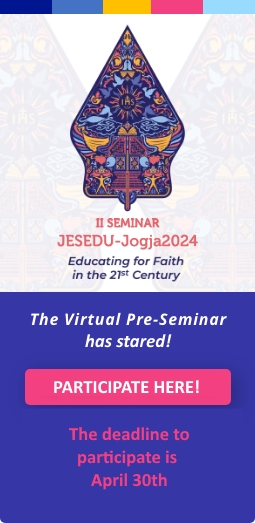We are delighted to share this interview with Maricel H. Fong, English Department Chairperson at Xavier School Nuvali, Laguna, Philippines, who participated as a facilitator in the Four Key Practices of Ignatian Spirituality course. This course is a facilitator-led global course that offers a new synchronous global learning experience for Ignatian educators. A new course modality that allows members of our global community to learn together in global groups with educators from different Jesuit schools around the world.
Maricel’s participation as a facilitator not only contributed to delivering on the holistic vision of education offered by Jesuit schools but it has also helped us, as a community, to keep growing as contemporary Jesuit educators. Thank you Maricel!
Without further ado here is Maricel’s facilitation experience.
If you are interested in knowing more about our facilitation opportunities, please contact Géllert Merza at info@educatemagis.org
Q1. What is your full name, current job title, job responsibilities, school name, city and country where you work?
My name is Maricel H. Fong. I am the English Department Chairperson in Xavier School Nuvali, Laguna, Philippines. I assist and mentor the English teachers in their instruction and ensure that they coincide with the curriculum of the school, and help them be formators aligned with the school’s vision-mission.
Q2. Where were you born? Can you briefly share with us a special memory from your own biography that relates to your first interest (curiosity) in Christian faith and Jesuit/Ignatian spirituality?
I was born in Manila, Philippines. My parents are both Catholics and I attended a Benedictine school for all girls (St. Scholastica’s College Manila) until high school. I became aware of the Ignatian Spirituality when I started working in Xavier School Nuvali 8 years ago. It was in my first year that I learned about the life of St. Ignatius, specifically his cannonball moment where everything started.
Q3. What is your relationship to the Jesuit/Ignatian spirituality? How important is it for your life, your personal ethos, to work for or be part of the Jesuit/Ignatian global community?
It is important to understand Ignatian spirituality once you are part of the Jesuit community. As a teacher, you are not only an educator but a formator and it is important to instill and immerse the students in Ignatian spirituality. Through practice you allow people around you to live a meaningful life of service for others.
Q4. Based on your personal experience, and your participation and facilitation of the Four Key Practices of Ignatian Spirituality course how do you feel it integrates with the global context of the document “Jesuit Schools: A Living Tradition in the 21st Century”?
With the complexities in life and how everything is fast-paced, especially in the 21st Century, I feel that by practicing the Four Key Practices of Ignatian Spirituality will allow us to be more reflective and discerning in what we do. Every now and then, we read and see things that may affect us emotionally. And as such, we may do things that would lead us to regret. Going through and facilitating the course helped me realize the importance of listening to the Spirit on what God is trying to move me to do and that He will always be with you in every step you take in life.
Q5. What other examples of global education projects or intercultural initiatives can you share with us from your own past in which you have been involved and what would you like to be involved in in the future?
Just recently, our school has been in touch with Colégio São Francisco Xavier. The teachers in Colégio São Francisco Xavier contacted us on having a joint project which we named, “Amigos de Javier.” Through such a project, our Grade 5 students would write to each other through letters. They would share each other’s experiences and culture and establish a connection from two sides of the world.
I hope we would have similar projects that would allow people to connect with others to strengthen our Jesuit community.
Q6. What has been your experience so far (positive/challenging aspects) in your active participation as a participant and facilitator in the Ignatian Spirituality course cohorts hosted by Educate Magis?
Being a participant and facilitator of the 4KP course permitted me to connect to people around the globe, and share, as well as listen to each other’s experiences. It has allowed me to journey with them just as St. Ignatius did with his companions and made me deeply appreciate how to be contemplatives in action .
Q7. Why do you think (if you do) it is important for Jesuit educators to learn about, practice and model Ignatian practices, such as the Examen, Discernment, Spiritual Conversation and being Contemplatives in Action in Jesuit schools around the world?
I believe I mentioned this earlier. It is important to understand Ignatian spirituality once you are part of the Jesuit community. As a teacher, you are not only an educator but a formator. As a formator, you need to form the people around you to see God in all things and be persons for others.
Q8. What is your favourite quote/phrase related to Ignatian Spirituality, from a historical or a modern figure that you admire?
My favorite quote by St. Ignatius is “Finding God in all things.” By seeing Christ in everything I do and encounter, I become more thankful and appreciative of the love He has for us.
